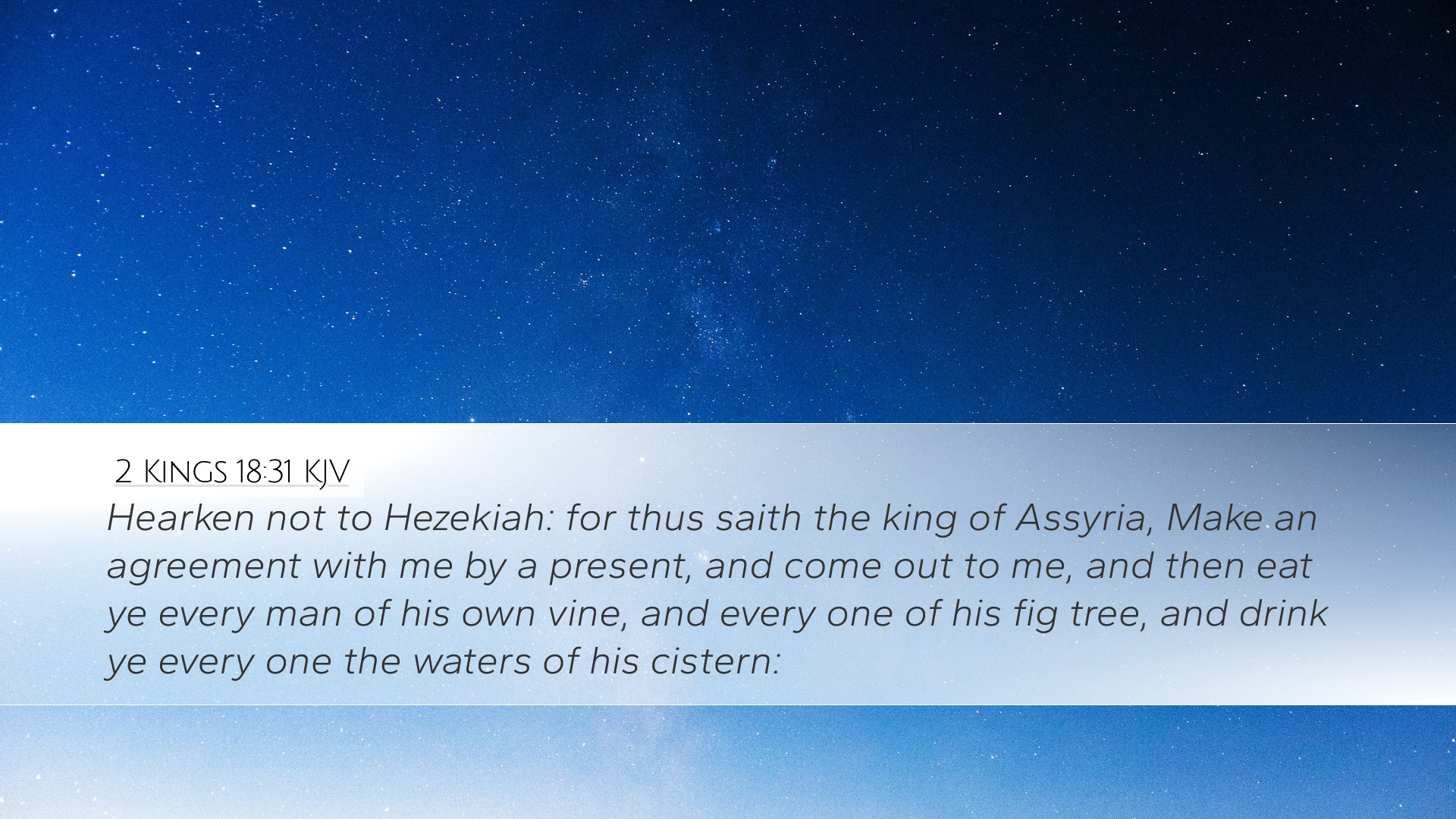Commentary on 2 Kings 18:31
Verse: "Do not listen to Hezekiah; for thus says the king of Assyria: ‘Make your peace with me by a present and come out to me; then each of you will eat from his own vine and each one from his own fig tree, and each one of you will drink the waters of his own cistern.'" (2 Kings 18:31 NKJV)
Introduction
The context surrounding 2 Kings 18:31 is crucial for understanding its implications both for the time of King Hezekiah and for contemporary interpretations. This verse reflects a time of crisis for the Kingdom of Judah and is a pivotal moment in the broader narrative of the Assyrian invasions.
Exegesis of the Text
This verse represents a direct challenge from the Assyrian king, seeking to undermine Hezekiah's authority and persuade his people to surrender. The appeals made by the Assyrian king to “make your peace” highlight the manipulative tactics often employed by political leaders in times of warfare—to tempt the people with promises of safety, prosperity, and autonomy.
Key Themes
- Manipulation and Promise: The Assyrian king’s offer is wrapped in the promise of personal security and comfort, symbolized by the invitation to eat from their own vines and fig trees. This illustrates human tendencies to seek peace through compromise in the face of overwhelming adversity.
- Faith versus Fear: This moment brings into sharp relief the struggle between faith in Yahweh and fear of external powers. Hezekiah, who is seeking to rely on God, faces the seductive words of an adversary who promises immediate relief.
Commentary Insights
Matthew Henry: Matthew Henry emphasizes the danger of listening to such offers of peace at the cost of fidelity to God. He points out that these appeals often come at a steep spiritual price, leading God's people away from trust in Him. He encourages believers to stand firm in faith, highlighting that true security comes from God, not from earthly kings.
Albert Barnes: Albert Barnes offers a historical perspective, underscoring the strategic nature of the Assyrian king's rhetoric. He notes that such tactics were common in ancient warfare and served to demoralize the enemy. Barnes emphasizes that Hezekiah's refusal to heed these words reinforces the theme of faith and divine reliance, encouraging believers to uphold their convictions despite external pressures.
Adam Clarke: Adam Clarke delves into the implications of the verse for God’s people, noting that the comfort offered here is deceptive. He describes the promised peace as a façade, offering abundant but illusory benefits. Clarke warns that succumbing to such temptations leads to spiritual bondage, portraying the Assyrian king as a figure representing worldly power that seeks to draw believers away from their ultimate source of strength.
Practical Applications
For pastors, students, theologians, and Bible scholars, the lessons from this passage resonate profoundly:
- Discernment in Leadership: Leaders must be discerning about the motives of those who offer help in desperate times. Just as Hezekiah faced temptations from the Assyrian king, leaders today must navigate pressures that may lead them away from God’s will.
- Emphasis on Faithfulness: This passage calls for a steadfast commitment to God’s promises. It reminds believers that true peace is found not in the comforts of this world, but in obedience to God.
- The Nature of Spiritual Warfare: The negotiation methods used by the Assyrian king represent a common tactic in spiritual warfare where believers are tempted to trade their reliance on God for momentary relief. Recognizing these patterns is critical for maintaining spiritual integrity.
Conclusion
In summary, 2 Kings 18:31 serves as a poignant reminder of the continual struggle between faith and fear, the need for vigilance against worldly temptations, and the profound importance of remaining steadfast in one’s dedication to God. By reflecting on the insights of Matthew Henry, Albert Barnes, and Adam Clarke, we are equipped to understand the depth of this scripture and its relevance for us today.


